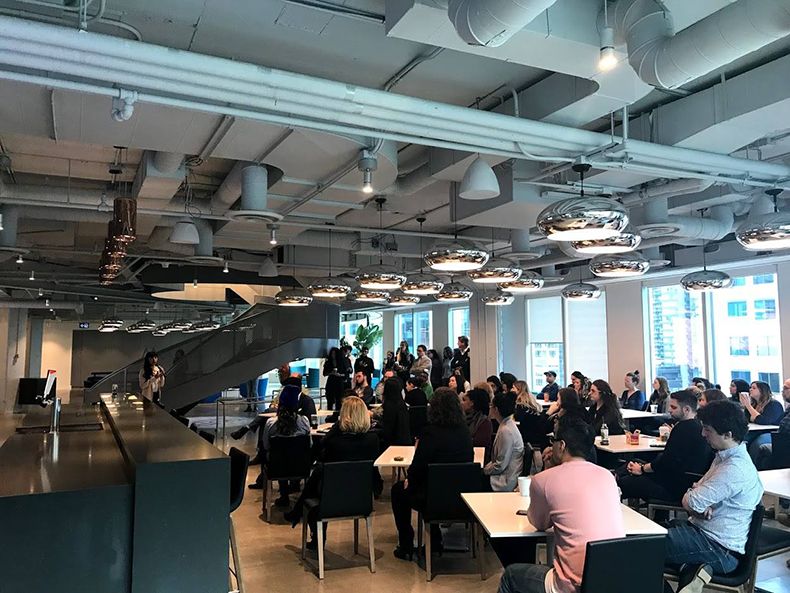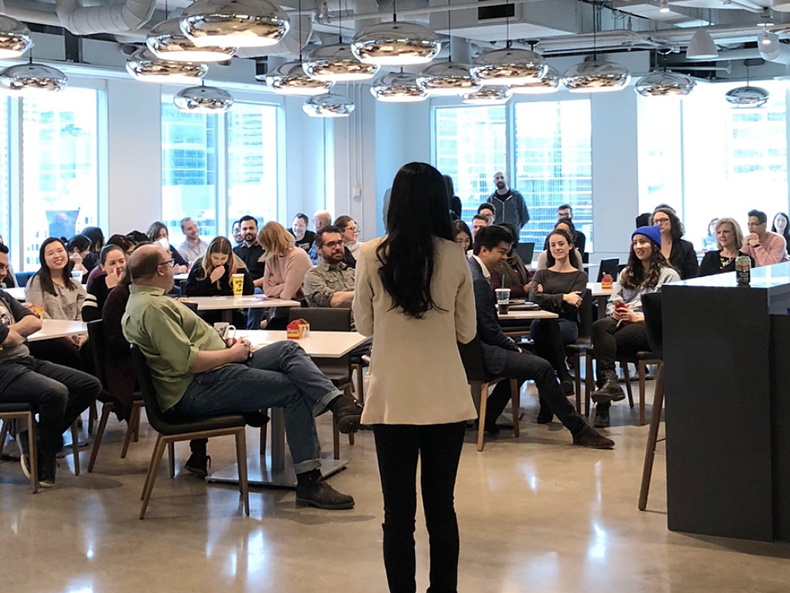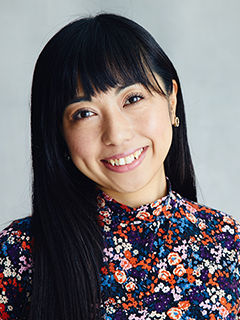Innovation Strategist
AUArts Alum 2009, BFA | Media Arts and Design Technologies
Just keep doing you what you're doing. There’s no need to doubt yourself. Just enjoy what your heart enjoys – the future’s bright.
AUArts: What do you do and where do you currently live?
Kyoko Ariyoshi: I am currently living in Toronto, Canada. I'm originally from Tokyo, and I work as an Innovation Strategist. Before that, I had my own business. I’ve also worked for MTV, Apple and Rakuten.
AUArts: What do you do as an Innovation Strategist?
Ariyoshi: My current employer’s brand mission is to improve the physical, mental and financial well-being of Canadians. After AUArts, I did a Master of Design program with a focus on human-centric business design and futures studies.
The focus in my master's and when I ran my own business was to create inner wealth and outer wealth through business, similar to my employer’s brand mission. That’s what I do as an Innovation Strategist. I utilize what I learned in my arts education to do so.
To me, art is not just about painting or drawing; it’s much more than that – it’s a concept and philosophy. I believe it's about finding and creating inner wealth in the world, and true artists make this happen so beautifully even when it feels like it’s impossible.
I have so much admiration for true artists, and I tried to systemize art’s inner wealth creation process and apply that model into business to create both inner wealth and outer wealth at the same time. In this way, we can experience more comprehensive, well-balanced, human-centric and happy wealth. I developed a business management model – Artistic Business Management Model – that makes this possible.
For example, within the current work model, people get used to making a lot of sacrifices for work, which lowers productivity as well as human-productivity (living life with your own definition of well-being and being able to achieve it). This lack of productivity is actually a severe problem in our society, both at micro and macro level. Businesses want to “win,” but they can’t win without people. People are often tired or disengaged in the current system; it’s said that 80% of Canadians are disengaged at work and this actually costs businesses billions of dollars. In short, in a system that strives to win, nobody’s actually winning. Businesses are great at creating outer wealth, but not so great at achieving inner wealth.
So, I thought about combining art and business together to have a more balanced idea of wealth. It’s evident in history that artists have much higher job engagement, productivity and happiness levels than other professions. When you think about it, you’re more productive when you’re happy and your human-productivity needs are met; this has positive ripple effects in business, too – it’s as simple as that.
Artistic Business Management creates a win-win situation – everybody actually wins. I’m quite passionate about this, and I love what I do very much.

AUArts: When you graduated, you worked at other places like MTV and Apple. What kind of jobs were those?
Ariyoshi: When I was in MADT (Media Arts and Digital Technologies), my instructors were amazing. They were very serious about growing artists who can make money. They instilled business skills in us, as well as strong artistic skills. They really pushed us to understand business language and what they do in business.
I developed stronger interests in business, merging business and art together, because I really thought that people need both inner wealth and outer wealth, as in personal satisfaction and money to be fulfilled and feel happy in life.
At AUArts, I spent a lot of time thinking about what I wanted to do after graduating, and I designed my career accordingly. I thought entrepreneurship was right for me. In order for me to start a business, I needed to have a lot of skills, experience and credentials, so that people would want to go into business with me. I envisioned what I wanted, and then planned backwards from there what I needed to do.
I figured that I needed to work for well-known companies, so that I could learn from the best. I also wanted to work in different parts of business, so that I could understand business as a comprehensive system. For example, when you work in sales for so long, you only understand sales language. But sales language is different from marketing language, marketing language is different from accounting language, and to be a really good businessperson who can create both inner wealth and outer wealth, I needed to understand everybody's languages.
I decided to start my career as a translator, so that I could not only understand everybody’s languages, but also translate them to create mutual understanding. My arts background was really beneficial in translating. Different languages have different expressions, culture, nuance, etc. and you have to read between lines to translate effectively. A lot of trained interpreters or translators cannot read between lines – they’re not supposed to. They do a very technical translation. And that's why a lot of things get lost in translation.
Art students are always forced to read between the lines and understand both literal language and non-literal language. So that was really useful.
After doing translation for MTV, I did business development for a start-up. I worked for Apple, doing marketing and data analysis. I also worked for a Japanese company called Rakuten in marketing, branding and strategy. Then I finally had enough credentials, experience and confidence to start my own business. I started a culture translation consultancy. I learned that it’s not the language that needs to be translated; it's the culture that needs to be translated for people to truly understand each other for relationship success as well as business success.
When there is good understanding, business runs smoothly and there is a relationship of trust between all stakeholders. I designed my business to be human-centric too, so that it created inner wealth and outer wealth at the same time. It was a very fulfilling experience. You’ve had a really interesting career. When you were young, did you imagine yourself to be an artist or a businessperson?
I wanted to be both. My family has a good mix of artists and business people. Many of my family members also studied abroad in different parts of the world. I grew up surrounded with lots of artistic and cultural things, as well as artists and business people. I was always leaning toward pursuing an artistic career. I tried many different things like dancing, acting, and painting. I had a very strong encounter with my favourite artist, Toulouse-Lautrec, and learned that art was exactly what I wanted to do.
AUArts: Was your family supportive of you going down this path?
Ariyoshi: Absolutely. My parents are very open-minded; they had very open-minded parenting. One thing they always told us: we won’t be mad at you if you don’t do your homework, because it's your choice and your responsibility. But we'll be mad at you if you're not pursuing your passion.
They said there's no such thing as a good school, a good job, a good career, a good company or a good life - you define it and make it yourself. They were passionate about developing our critical thinking abilities.
I have older siblings, a brother and a sister, and all three of us have ended up doing what we absolutely love to do, and we’re pretty happy, too. So I didn't need to convince them that I wanted to go into art school. We talked a lot growing up. They knew how my thinking developed over time. But I understand that some people have to do a lot of convincing. It’s natural for parents to be concerned and cautious about their children’s lives.
AUArts: What advice would you give to someone whose parents were not supportive about going to art school? What would you suggest to them?
Ariyoshi: Art is underrated. It's very underrated, and not understood in the right way. I did pretty thorough research in my master's degree on how art evolved in history. According to our neurological and historical development, being artistic actually means having the capability to foresee, imagine, create, empathize, find value and to be human-centric in the pursuit of beauty and fulfillment. Being a true artist means being able to make strenuous efforts to achieve ideals of any kind, be it a business model or painting or system design.
I think it’s the artists’ responsibility to explain what artistic talent and capability enable us to do. It goes beyond painting or drawing or theatre or music. I believe that art is the only discipline that enables us to create inner wealth and outer wealth at the same time, in a human-centric kind of way.
For people who need to convince their parents, I would encourage them to really think about what art means to them and what they are trying to achieve through their arts education. There could be so many different answers. It could be so many different things, and that's the beauty of art too. It’s inclusive, and it's open-minded and supportive of any type of beauty as an artist defines it.
I would encourage them to really think through and understand what their talent is, and then to use the right language to convey their message to others. I think that people who want to pursue art are definitely very special.
I’ve spent a lot of time in business and thinking in both arts language and business language. In today’s social climate, everyone’s more socially conscious and wants a human-centric approach. I think that artists can expand their capabilities beyond what is understood as “art” today. The possibilities are really endless for them, and it’s up to them to decide.

AUArts: You said that you're originally from Tokyo. Did you go directly from Tokyo to AUArts then?
Ariyoshi: Yes. From Tokyo to Calgary.
AUArts: How did you decide on AUArts out of all the schools that you could go to?
Ariyoshi: I thought that I needed to get myself a second skill, as art degrees traditionally don’t guarantee jobs. I’ve always loved English, so I chose English as my backup skill. I was also always intrigued by Western art, so it made sense to study in an environment where much of my favourite art came from.
There were definitely more well-known schools, and I could have gone to any of them. I talked to people who graduated from those schools, and they told me that the instructors were more focused on their own careers, and less on what their students were doing. So they didn't really get a good education after all.
There were schools located in big cities like New York, Los Angeles, London, Paris. But the Japanese population in those cities is big, so my friends told me that they were in a bubble. They came back to Japan with English skills that were not on a professional level.
I couldn't afford to let that happen to me, because English was going to be my backup skill. I didn't want to be in a bubble, and I didn’t want to be taught by educators who were not committed to teaching.
Because I come from a big city, I felt there was no point of going to another big city. There are a lot of businesses, a lot of people, so it felt like New York, London, Tokyo, are all kind of the same in a way.
If I were to go somewhere, I wanted to be in a completely different environment to challenge my view and expand my horizons. I wanted to go somewhere different. Creating this formula, adding all these elements together, led me to ACAD (now AUArts) in Calgary.
Calgary is a city, but it's smaller than Tokyo. The Japanese population was very small back then. So I was not going to be in a bubble. I was forced to speak in English and understand the culture.
I really wanted to understand the culture. Because language is attached to culture, one does not exist without the other. That’s how I formulated my path to Calgary.
I communicated with AUArts basically every day before and after making my decision. They were super helpful and very friendly. I was going there alone, but I didn't have to worry at all. I contacted other schools, but there was no school that was as helpful as AUArts was.
AUArts: When you came to Calgary, you didn't really speak English or had a limited understanding of English?
Ariyoshi: A very, very limited understanding. But people were very kind and helpful, and I became much more comfortable after my second year.
How did it feel when you actually got here?
Super welcoming. The people from the Administration office actually helped me go shopping the first day. They showed me where the Safeway was, and they carried everything for me to my dorm. It was very friendly, very welcoming. I had a great time at AUArts.
AUArts: What would you say is the most important thing that you learned going to AUArts?
Ariyoshi: My understanding of art, that it's a concept and philosophy. So learning about what art can do was definitely one of the most important things.
The instructors in MADT were absolutely amazing – amazing artists, amazing educators and amazing people. I was an ESL student (English as a Second Language), but I never felt so understood.
I consider them my role models and mentors. I graduated 10 years ago, but they still help me without question, without a second thought.
AUArts: If you could talk to yourself in high school, what encouragement would you give yourself?
Ariyoshi: Just keep doing you what you're doing. There’s no need to doubt yourself. Just enjoy what your heart enjoys – the future’s bright.
